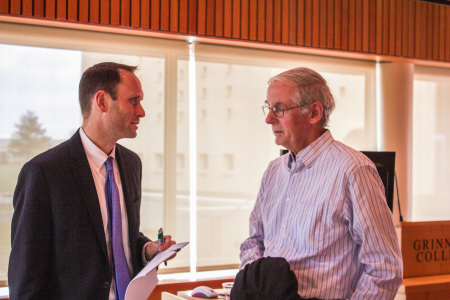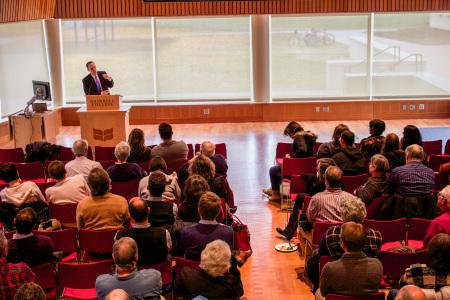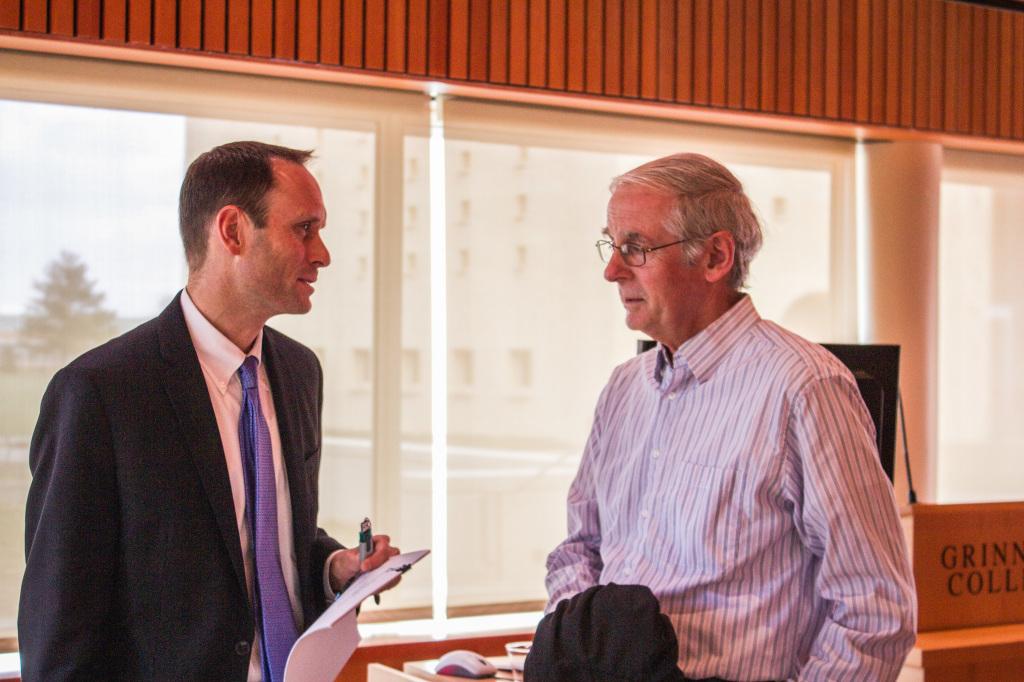Dean of the College and professor of history Michael Latham gave his first Scholars’ Convocation titled “Development at War: The United States and Modernization in South Vietnam” at noon on Wednesday, Nov. 12 in JRC 101. Latham was the last convocation speaker of the 2014 fall semester, and the program will resume next year.
As a specialist in the history of U.S. foreign relations, twentieth-century America and the global history of the Cold War, Latham discussed the relationship between American ideals of development and the American foreign policy during the Vietnam War.
For many years, Latham has been interested in the topic of American motives when creating foreign policies and this talk was the first time he had the opportunity to share his analysis of these themes with the Grinnell community.

Photo by Sarah Ruiz.
“There are some studies that suggest that policymakers act based on the national interest,” Latham said. “However, another approach says it is all about economic interests. I have always found both of these approaches unsatisfying. I do not think interests are obvious.”
Because of the limited view the two main approaches have when examining U.S. foreign policies, Latham challenged his audience at the conference to examine American actions by analyzing ideals and culture, especially in terms of America’s position at the peak of the Cold War.
“There was an ideological struggle between the U.S. and its Cold War opponents, the Soviets and the Chinese. Both sides were presenting opposite views regarding what development should look like,” he said. “They were presenting competing visions of historical change.”
Over the course of his convocation speech Latham explained to the audience, comprised of both students and faculty, that America created a particular model of development that was closely connected to the idea of national security. Following, Latham argued Americans believed that if they could sway the course of development of the newly emergent countries of the era, such as South Vietnam, in a particular direction, their own interests would be protected. Ultimately, America believed it could create liberal, capitalist, semi-democratic states that would help it accomplish its security goals by generating a specific outcome.
Latham explained how this ideological schema was the driving force behind the American tactics in Vietnam.
“The United States tried to make developments on this specific case a vehicle to win the war,” Latham added before outlining the details of the “Strategic Hamlet Program” to the audience. The program was a village-level development program where citizens of South Vietnam were placed together in secluded areas and under military control at all times.
“We can see this interesting tension, we can see people who truly and sincerely believed this was the best way to protect Vietnamese society while at the same time they were proposing policies that where doing great damage to it,” Latham added when explaining the effects that this program had on the Vietnamese community
Latham finished his talk by clarifying the link between security and development, which still exists and dictates many of the foreign policies implemented by the United States even if the context in which it manifests itself has changed.
“I believe these ideas are still with us, just look at the debate in Iraq and Afghanistan especially in the past five years,” he said.

Photo by Sarah Ruiz.
Latham’s talk is part of the ongoing Scholars’ Convocation series, which was established in the late 1970s. The objective of these talks is to provide a common educational experience to the entire Grinnell community, and the next Convocation, the Rosenfield Chicago Symposium, will be held on Feb. 4, 2015.


































































